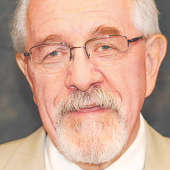- Christmas shopping is done, presents wrapped, strings attached? (12/14/16)
- Cecil is dead and human lives are threatened every day (8/12/15)
- As state flags go, Nebraska's ranks 50th (7/8/15)
- When everything looks like a nail (4/29/15)
- Who remembers to coal slurry pipeline debate? (3/11/15)
- More revelations in Department of Corrections mess (12/17/14)
- The Legislature becomes more Republican (11/19/14)
Opinion
Lincoln to take look at good time laws
Wednesday, October 23, 2013
Kids know if they behave in church they're likely to get a treat, or money. Do well in school, same thing. Do well in life; good things will come your way. We reward good behavior for good people.
But what about bad people? Can rewards make a difference in how they behave? The Nebraska State Corrections System has used "good time" for years to help reward inmates who behave well and also to give them an early release date, which eases prison overcrowding. The Department of Correctional Services is at about 149 percent of capacity. Yes, that's more inmates than the space was designed for.
So, prison good time -- which starts the minute the inmate enters the system -- is a necessary tool. One good time day for each good day in the system. In essence, sentences are cut in half for well-behaved inmates. That's in a perfect world. Sometimes the lines are blurred and sometimes the bad guys get the same breaks.
Take the highly celebrated case of Nikko Jenkins, the 27-year-old Omaha inmate who lost minimal good time for what some consider to be pretty serious infractions behind bars. Jenkins allegedly: assaulted a guard while on furlough to attend a family funeral in Omaha; helped incite a prison riot; attacked several inmates and participated in gang activities behind bars. For all that, he lost about a year and a half in good time. Within a month of his early release from prison, he allegedly killed four people in Omaha. That incident has rightly concerned the governor and some lawmakers and law enforcement officials.
The Chairman of the Legislature's Judiciary Committee, Sen. Brad Ashford of Omaha, has called on Gov. Dave Heineman's administration to change the good time rules administratively. That's because the Legislature's filibuster king -- state Sen. Ernie Chambers of Omaha -- has vowed to fight any effort to reduce good time. For his part, he knows that good time is a valuable tool for controlling inmate populations and granting early release to alleviate overcrowding.
A public hearing on the proposed rules and regs changes will be held Thursday, Nov. 7, in Lincoln. Omaha lawmaker Heath Mello says he has taken a wait-and-see attitude on the matter. If the changes are adopted, it will be a great first step, Mello said. But it's a much more complicated issue than just making rules and regs changes. Mello is part of a working group looking at alternative sentencing, mental health and drug courts and overcrowding.
Currently, prisoners can lose time for the most serious offenses such as murder, manslaughter, inciting a riot, escape or drugs. But it's only three months lost if there is no death or serious injury involved and one year if there is. Under the proposed change, those penalties would double.
Heineman has called for an end to automatically awarding good time. He said violent convicts should have to earn good time. Corrections Department spokeswoman Dawn Renee Smith said good time is taken away when appropriate. If the punishment were used more often, it could lose its significance.
The Omaha World-Herald has reported that over the past five years, inmates have been punished for 92,000 infractions, yet good time credit was taken away in less than 5 percent of those cases. Courts can impose additional prison time for crimes committed behind bars, but the prison system can take away or add good time as it sees fit. They say they routinely use other punishments instead of keeping prisoners behind bars longer.
Omaha State Sen. Steve Lathrop says the troubling thing is that there's no relationship between good behavior and good time. That dispels the assumption that good time is also taken away for bad behavior. He said the Jenkins case is an appalling example of how the system doesn't work right. Smith said good time is just one of many deterrents that can keep prisoners in line.
Senator Beau McCoy of Omaha, one of several lawmakers running for the gubernatorial nomination, says he'll introduce a bill in January to reform state laws on the matter and to ensure that the death penalty is used. Heineman has noted that endless debate and state legislators' efforts to repeal capital punishment have left murderers unconcerned about the prospect of execution.
Both issues must be carefully studied and changes applied only if they are going to be enforced. Alas, the system is no better than the sum of its fallible parts.

